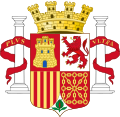Miguel Ezquerra facts for kids
Quick facts for kids
Miguel Ezquerra
|
|
|---|---|
| Born | 10 January 1913 Canfranc, Spain |
| Died | 29 October 1984 (aged 71) Madrid, Spain |
| Allegiance | |
| Service/ |
|
| Years of service | 1936–1939, 1941–1945 |
| Rank | Alférez provisional Hauptsturmführer |
| Unit | Blue Division Walloon Legion Blue Legion |
| Battles/wars | Spanish Civil War World War II
|
Gonzalo Miguel Ezquerra Sánchez (born January 10, 1913 – died October 29, 1984) was a Spanish soldier. He was part of a political group called the Falangists. He also volunteered to join the Waffen-SS, which was a part of the German military during World War II.
Miguel Ezquerra fought in two major wars: the Spanish Civil War and the Second World War. In World War II, he was part of a Spanish group called the Blue Division. The German Army knew this group as the 250. Infanterie-Division.
Contents
Early Life and Spanish Civil War
Miguel Ezquerra was born in Canfranc, a town in Aragon, Spain. His father was a miller. When the Spanish Civil War started in July 1936, Ezquerra quickly joined the Nationalist side.
He fought in many important battles across Spain. He was wounded near Huesca. During the war, he was promoted to different military ranks. He also received several medals for being brave. After the war ended in 1939, he finished his military service. He then married Consuelo Reinoso, and they had two daughters.
Fighting in World War II
When World War II began, Miguel Ezquerra wanted to help Germany. He even visited the German embassy in Madrid to offer his help. Later, when Spain decided to send volunteers to fight on the Eastern Front, he joined the Blue Division.
The Blue Division was sent to the siege of Leningrad in Russia. There, they took part in a very tough battle called the Battle of Krasny Bor.
Continuing the Fight
The Blue Division returned to Spain in April 1944. But Miguel Ezquerra was determined to keep fighting. He secretly crossed the border into France. He then joined the Wehrmacht, which was the main German army. Later, he moved to the Waffen-SS.
Ezquerra became a Hauptsturmführer, which was a military rank. He fought with a German division called the "Nordland" division. They defended the town of Stettin in Germany.
Battle of Berlin
From April to May 1945, Miguel Ezquerra was in Berlin. He led three groups of Spanish volunteers. They were defending the city from the Soviet army during the Battle of Berlin.
Ezquerra and his Spanish fighters joined up with other German soldiers. They fought in the central part of Berlin, near the Reichstag building. He was even among the last people defending the bunker where Adolf Hitler was.
After the war, Soviet troops briefly captured Ezquerra. But he was released. He then traveled secretly across Western Europe, pretending to be from Argentina. Finally, he returned to Spain.
Later Life and Historical Questions
Miguel Ezquerra wrote a book called Berlín, a vida o muerte (which means "Berlin, to life or death"). Not much is known about his life after the war. Many people agree that he was one of the most well-known Spanish fighters in World War II.
Ezquerra claimed he received several high awards, like the Knight's Cross of the Iron Cross. He also said that Hitler personally gave him German citizenship. However, there is no strong proof to support these claims.
Some historians, like Kenneth W. Estes, have questioned Ezquerra's stories. While it is true that he was in Germany and that a unit might have been named after him, his exact rank and what he did in some events are debated. Historians have not found evidence to confirm all his claims about his role in the war.
Miguel Ezquerra passed away on October 29, 1984. Since 1995, his remains have been buried next to his fellow soldiers in the Vault of the Blue Division in Madrid, Spain.
Images for kids
See also




